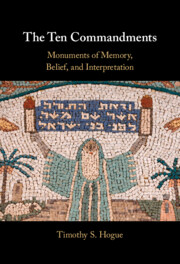Refine search
Actions for selected content:
12 results
18 - Moral Law
- from Part II - Theological Themes
-
-
- Book:
- The Origins of Scholasticism
- Published online:
- 18 November 2025
- Print publication:
- 08 January 2026, pp 495-518
-
- Chapter
- Export citation

The Ten Commandments
- Monuments of Memory, Belief, and Interpretation
-
- Published online:
- 20 September 2023
- Print publication:
- 28 September 2023
Chapter 7 - The Re-cognition of Doctrinal Discourse and Scholastic Literary Theory
-
-
- Book:
- Literary Theory and Criticism in the Later Middle Ages
- Published online:
- 20 April 2023
- Print publication:
- 20 April 2023, pp 137-158
-
- Chapter
- Export citation

Lying and Truthfulness
- A Thomistic Perspective
-
- Published online:
- 22 December 2022
- Print publication:
- 05 January 2023
12 - “Between Man and God” and “Between Man and His Fellow”
- from D - Religious Conceptions of Law
-
-
- Book:
- Law as Religion, Religion as Law
- Published online:
- 11 August 2022
- Print publication:
- 25 August 2022, pp 291-313
-
- Chapter
-
- You have access
- Open access
- HTML
- Export citation
3 - Hell on Crete
- from Part I - Crete
-
-
- Book:
- Hell in the Byzantine World
- Published online:
- 02 October 2021
- Print publication:
- 17 September 2020, pp 117-190
-
- Chapter
- Export citation
3 - Hell on Crete
- from Part I - Crete
-
-
- Book:
- Hell in the Byzantine World
- Published online:
- 02 October 2021
- Print publication:
- 17 September 2020, pp 117-190
-
- Chapter
- Export citation
Chapter 7 - E Pluribus Unum for All Faiths and for None
- from Part II - Homo Religiosus: Reflections on God and Religion
-
- Book:
- Giving the Devil his Due
- Published online:
- 28 February 2020
- Print publication:
- 09 April 2020, pp 81-85
-
- Chapter
- Export citation
4 - Biblical Law and Literature
-
-
- Book:
- The Cambridge Companion to the Bible and Literature
- Published online:
- 13 March 2020
- Print publication:
- 26 March 2020, pp 63-79
-
- Chapter
- Export citation
2 - The Government’s Speech and Religion
-
- Book:
- The Government's Speech and the Constitution
- Published online:
- 12 August 2019
- Print publication:
- 22 August 2019, pp 68-92
-
- Chapter
- Export citation
Introduction: Christianity and American Law
-
-
- Book:
- Great Christian Jurists in American History
- Published online:
- 24 June 2019
- Print publication:
- 04 July 2019, pp 1-15
-
- Chapter
- Export citation
THE FIRST COMMANDMENT WITH A PROMISE: RECENT AMERICAN PREACHING ON “HONOR YOUR FATHER AND YOUR MOTHER”
-
- Journal:
- Journal of Law and Religion / Volume 31 / Issue 2 / July 2016
- Published online by Cambridge University Press:
- 13 June 2016, pp. 169-182
-
- Article
- Export citation
